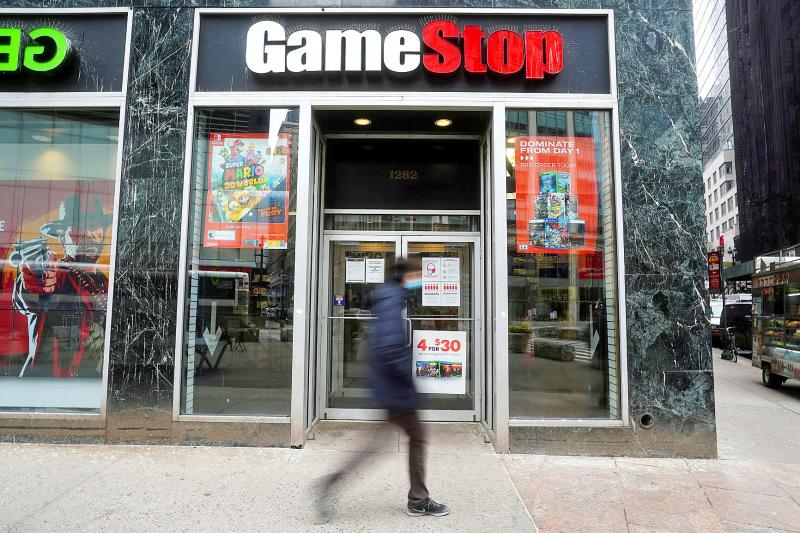GameStop Corp on Thursday plummeted, snapping a dizzying six-day rally and wiping out nearly US$11 billion in market value after brokers choked off demand for the stock by curbing trading on the apps used by the firm’s zealous fan base.
On Thursday, the stock plunged 44 percent after Robinhood Markets, Interactive Brokers Group Inc and others took steps to curtail activity in several high-flying stocks, including GameStop and AMC Entertainment Holdings Inc.
E*Trade Financial Corp is preventing customers from purchasing shares of both firms, a person familiar with the matter said.

Photo:Reuters
GameStop shares on Thursday jumped during extended trading, after Robinhood said that it would allow limited buying of certain securities yesterday.
“We’re beginning to open up trading for some of these securities in a responsible manner,” the firm said in a statement.
GameStop rose 46 percent in post-market trading, while AMC climbed 29 percent.
The video game retailer triggered 19 volatility halts on its way to shedding more than twice what it was worth on Monday.
Volume also fell, with about 55 million shares traded by Thursday afternoon, a far cry from its record of 197 million on Friday last week.
The trading curbs resulted in howls of outrage on Reddit’s WallStreetBets forum, which has been the launching point for many of this week’s blistering rallies.
Robinhood has been hit by lawsuits from customers.
It also prompted lawmakers to criticize restrictions imposed on retail investors.
US Senator Sherrod Brown, incoming chairman of the US Senate Banking Committee, said that he plans to hold a hearing on the “current state of the stock market.”
The clampdown by brokerages extended beyond GameStop to other popular stocks, such as BlackBerry Ltd, that have surged this week, burning short sellers and hedge funds.
The phenomenon attracted the attention of regulators on Wednesday, with the US Securities and Exchange Commission saying that it was monitoring the situation.
“The inability to trade depressed the volume, and high volume is what kept the stock trading at a high level,” Wedbush Securities Inc analyst Michael Pachter said. “I’m actually surprised the trading platforms think they can manage the market this way, and expect they will reverse their decision shortly.”

South Korea’s equity benchmark yesterday crossed a new milestone just a month after surpassing the once-unthinkable 5,000 mark as surging global memory demand powers the country’s biggest chipmakers. The KOSPI advanced as much as 2.6 percent to a record 6,123, with Samsung Electronics Co and SK Hynix Inc each gaining more than 2 percent. With the benchmark now up 45 percent this year, South Korea’s stock market capitalization has also moved past France’s, following last month’s overtaking of Germany’s. Long overlooked by foreign funds, despite being undervalued, South Korean stocks have now emerged as clear winners in the global market. The so-called “artificial intelligence

NEW IDENTITY: Known for its software, India has expanded into hardware, with its semiconductor industry growing from US$38bn in 2023 to US$45bn to US$50bn India on Saturday inaugurated its first semiconductor assembly and test facility, a milestone in the government’s push to reduce dependence on foreign chipmakers and stake a claim in a sector dominated by China. Indian Prime Minister Narendra Modi opened US firm Micron Technology Inc’s semiconductor assembly, test and packaging unit in his home state of Gujarat, hailing the “dawn of a new era” for India’s technology ambitions. “When young Indians look back in the future, they will see this decade as the turning point in our tech future,” Modi told the event, which was broadcast on his YouTube channel. The plant would convert

‘SEISMIC SHIFT’: The researcher forecast there would be about 1.1 billion mobile shipments this year, down from 1.26 billion the prior year and erasing years of gains The global smartphone market is expected to contract 12.9 percent this year due to the unprecedented memorychip shortage, marking “a crisis like no other,” researcher International Data Corp (IDC) said. The new forecast, a dramatic revision down from earlier estimates, gives the latest accounting of the ongoing memory crunch that is affecting every corner of the electronics industry. The demand for advanced memory to power artificial intelligence (AI) tasks has drained global supply until well into next year and jeopardizes the business model of many smartphone makers. IDC forecast about 1.1 billion mobile shipments this year, down from 1.26 billion the prior

People stand in a Pokemon store in Tokyo on Thursday. One of the world highest-grossing franchises is celebrated its 30th anniversary yesterday.